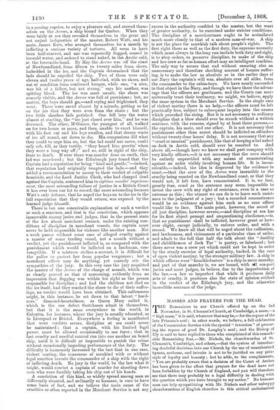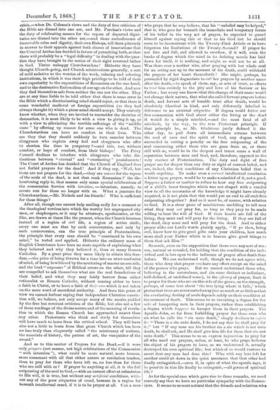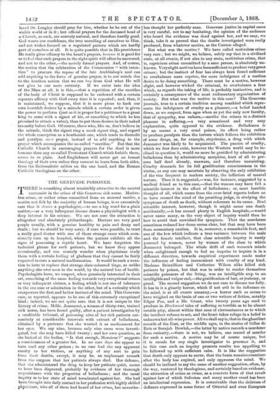MASSES AND PRAYERS FOR THE DEAD.
fr HE Romanizers in our Church offered bp on the 3rd November, in St. Clement's Church, at Cambridge, a mass,—a "high mass," it is said, whatever that maybe,—for the repose of the late Primate's soul ; in other words, we believe, a full celebration of the Communion Service with the special " intention " of procur- ing the repose of good Dr. Longley's soul ; and the Bishop of Ely is said to have replied to those who complained of this remark- able Romanizing feat,—Mr. Nichols, the churchwarden of St. Clement's, Cambridge, and others,—that the system of introduc- ing doubtful doctrines into our Church by the use of unauthorized hymns, anthems, and introits is not to be justified on any prin- ciple of loyalty and honesty ; but he adds, to the complainants, "You are probably aware that a decision of the Court of Arches has been given to the effect that prayers for the dead have not been forbidden by the Church of England, and you will therefore see that there may probably be a legal difficulty in dealing with the question which you have brought to my notice." No humane man can help sympathizing with Mr. Nichols and other unhappy churchwardens of English churches in this critical ecclesiastical
crisis,—when Dr. Colenso's views and the duty of free criticism of the Bible are dinned into one ear, and Mr. Purchas's views and the duty of celebrating masses for the repose of departed digni- taries are dinned into the other ear,—and those embodiments of immovable calm and dignity, their own Bishops, tell them piteously in answer to their appeals against both classes of innovations that the Court of Arches has decided in favour of permitting both, so that there will probably be a "legal difficulty" in dealing with the ques- .tion they have brought to the notice of their right reverend father in God. Thrice unhappy Churchwardens ! Hitherto they have thought Church-going, and Church ministrations generally, a sort -of mild sedative to the worries of the week, calming and sobering • institutions, in which it was their high privilege to be told of their -own superiority to the superstitions of Romanism on the one hand, and to the destructive Rationalism of our age on the other. And now they find themselves safe from neither the one nor the other. They are at any time liable to be told either that there is some error in the Bible which a discriminating mind should reject, or that there is -some wonderful medieval or foreign superstition (as they had always thought it) which a pious mind should accept. They scarcely know whether, when they are invited to reconsider the doctrine of -damnation, it is most likely to be with a view to giving it up, or with a view to alleviating the terrible sufferings of the "middle state" by offering up masses for some one who is dead. The Churchwardens can have no comfort in their lives. Who -are they that they should suddenly be torn asunder between -clergymen who explain away hell and clergymen who offer to shorten the time in purgatory ?—and this, too, without -comfort, or hope of comfort, from their bishops! The Privy - Council declines to interfere with clergymen who take dis- tinctions between " eternal " and " everlasting " punishments ! The Court of Arches has decided that the Church of England does not forbid prayers for the dead ! And if they say, Well, but these are not prayers for the dead,—they are masses for the repose of the souls of the dead, is not that rank Romanism ?' the dis- heartening reply is, that masses only mean special celebrations of -the communion Service with intention, — intention, namely, to secure rest for those no longer with us. What a juncture for Churchwardens,—Mr. Nichols and his friends! Who is sufficient for these things ?
After all, though one cannot help smiling sadly for a moment at the theological vortices into which the worthy but unprepared city men, or shopkeepers, or it may be attorneys, apothecaries, or the like, are drawn at times like the present, when the Church becomes instead of a region of still life, a region of active strife, -every one must see that by such controversies, and only by • -such controversies, can the true principle of Protestantism, the principle that every man should be "convinced in his own mind," be tested and applied. Hitherto the ordinary mass of English Churchmen have been no more capable of explaining what –they believed and why they believed it, than so many Roman Catholics. By a great price they seem likely to obtain this free- -dom,—the price of being thrown for a time into an utter confusion -of mind, of being bewildered by the muttering of masses on one side, and the loud "exposure" of Biblical errors on the other, till they -are compelled to ask themselves what are the real foundations of their belief, and what they may fairly borrow from either rationalist or Roman Catholic, without ceasing either to have -a faith in Christ, or to have a faith of their own which is not taken -on the mere word of sacerdotal authority. And from this point of view we cannot forbear saying that independent Christian convic- tion will, we believe, not only accept many of the results yielded by the free but reverent criticism of the Bible, but also not a few -of those readings of the divine nature and of the meaning of revela- tion to which the Roman Church has approached nearer than -any other. Protestants who think and study for themselves will have much to learn from the critical school. They will have also not a little to learn from that great Church which has been no less truly than eloquently called "the missionary of nations, the associate of history, the patron of art, the vanquisher of the sword."
And as to this matter of Prayers for the Dead,—if it were -only prayers (not masses, not high celebrations of the Communion "with intention "), what could be more natural, more human, more consonant with all that either nature or revelation teaches, than to pray for those who have left us, no less than for those who are still with us ? If prayer be anything at all, it is the full -outpouring of the soul to God,— with an earnest effort at submission to His will, it is true, but without any artificial conditions, with- out any of the poor etiquettes of creed, because in a region far beneath intellectual creed, if it is to be prayer at all. Can a man
who prays that he may believe, that his "unbelief may be helped," that is, who goes far beneath the immediate and temporary forms of his belief in the very act of prayer, be expected to guard himself against saying this or that to his God lest he should seem to be inconsistent with the Twenty-First Article or to have forgotten the limitations of the Twenty -Second? If prayer be not free and full, and allowed to overflow, if it will, even the banks of dogma which the mind in its defining moods has laid down for itself, it is nothing, and might as well not be at all. Was there ever a mother who, after praying with her whole soul for an erring son up to the moment of his death, could withhold the prayers of her heart thenceforth ? She might, perhaps, be persuaded by rigid dogmatists to call her prayers by another name after his death,—to speak of them, say, as acts of trust, as efforts to trust him entirely to the pity and love of his Saviour or his Father ; but every one knows that this change of their name would not change their nature, that what she called fervent prayers before death, and fervent acts of humble trust after death, would be absolutely identical in kind, and only differently labelled in deference to an external etiquette. If dogma could fetter our free communion with God about either the living or the dead it would do a simple mischief,—and the most fatal of all mischiefs, by the way, to the true Protestant principle. If that principle be, as Mr. Gladstone justly defined it the other day, to pull down all intermediate screens between the soul of man and the spirit of God, any dogma which succeeded in setting a penalty on the free outpouring of the soul concerning either those who arc gone from us, or those still with us, would be in the deepest and truest sense a wall of separation between man and God, and, therefore, opposed to the very essence of Protestantism. The duty and right of free prayer are far deeper than any duty or right of correct belief, and are, indeed, the first conditions of any Christian belief that is worth anything. To make even a correct intellectual conclusion a fetter upon prayer, would be to make a mischief of it, not a good. Suppose a father or mother to refuse to hear any free outpouring of a child's inner thoughts which was not shaped with a careful view to all the accuracies of the knowledge it might have already acquired, is it not plain that this would put an end to all such free outpouring altogether? And so it must be, of course, with relation to God. It is a sheer piece of mischievous meddling to tell men what they may not pray for, so long as they pray to be made willing to bear the will of God. If their hearts are full of the living, they must and will pray for the living. If they are full of the dead, they must and will pray for the dead. And to either prayer alike our Lord's words plainly apply, "If ye then, being evil, know how to give good gifts unto your children, bow much more shall your Father which is in heaven give good things to them that ask Him !"
So much, even on the supposition that there were any sort of rea- son, natural or revealed, for holding that the condition of the indi- vidual soul is less open to the influence of prayer after death than before. We can understand well, though we do not agree with, those who deny that prayer can have any effect except on the mind of the person who prays. But we cannot understand those who, believing in the naturalness, and (in some distinct or indistinct, half-defined, or undefined sense), in the efficacy of prayer, limit it to prayer for those who are on this side of the grave, on the strength, perhaps, of some text about 'the tree lying where it falls,' which proves that trees are never carted away just as much or as little as tha t the everlasting destiny of souls depends solely on their condition at the moment of death. This seems to us inventing a dogma for the sake of hampering men_ in their prayers, rather than establishing a dogma which happens to hamper them in their prayers. The Apostle John, so far from forbidding prayer for those even who sin what he calls the "sin unto death," simply declines to enjoin it : "There is a sin unto death, I do not say that he shall pray for it ;" but "If any man see his brother sin a sin which is not unto death, he shall ask, and He shall give him life for them that sin not unto death." This seems to us an express injunction to pray for all who need our prayers, unless, at least, he who prays believes the object of his prayers to have, as we understand it, actually destroyed his own spiritual life ; but which of us would venture to assert that any man had done this? Who with any love left for another could sit down in the quiet assurance that that other had finally extinguished,—even if, in spite of what the apostle says, it be possible in this life finally to extinguish,—all germs of spiritual life ?
As for the special case which gave rise to these remarks, we need scarcely say that we have no particular sympathy with the Roman- izers. It seems to us most natural that the friends and relatives who, loved Dr. Longley should pray for him, whether he be out of the visible world or in it ; but official prayers for the deceased head of a Church, as such, are scarcely natural, and therefore hardly good. God wants our confidence, the true unveiling of ourselves to Him, and not wishes formed on a regulated pattern which are hardly part of ourselves at all. It is quite possible that in His providence He really gives efficacy to the heart's prayers, because it is good for us to feel that such prayers in the right spirit will often be answered, and not to the other,—the merely formal prayers. And, of course, the notion that the celebration of the Communion "with inten- tion" to procure the repose of the late Archbishop's soul can add anything to the force of genuine prayer, is to our minds due to the heathen notion that we can buy from God what He will not give to our mere entreaty. If we enter into the idea of the Mass at all, it is this,—that a repetition of the sacrifice of the body of Christ is supposed to be endowed with a certain separate efficacy with God every time it is repeated ; and, then, it is maintained, we suppose, that it is more pious to back our own heartfelt desires by a miracle which a certain order is given the power to perform (just as it is proper for a petitioner to a great king to come with a signet of his, or something to which he has promised to attach a value), than to put those desires in their naked intensity before God. Of course, those who, like us, don't believe in the miracle, think the signet ring a mock signet ring, and regard the whole conception as a heathenish one, which tends to discredit and paralyze mere prayer, instead of to add anything to the prayer which accompanies the so-called "sacrifice." But that the Catholic Church in encouraging prayers for the dead is more humane than any so-called Protestant Church which forbids them, seems to us plain. And Englishmen will never get an honest theology of their own unless they consent to learn from both sides, from the Rationalistic critics on the one hand, and the Roman Catholic theologians on the other.




































 Previous page
Previous page